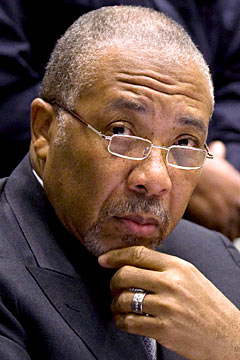 MONROVIA, Liberia — With President Charles Taylor’s war crimes trial in The Hague nearing an end after three years, many Liberians hope he will be brought home — to a hero’s welcome.
MONROVIA, Liberia — With President Charles Taylor’s war crimes trial in The Hague nearing an end after three years, many Liberians hope he will be brought home — to a hero’s welcome.
Take Fasu Donzo, a lanky motorbike taxi driver. Now 31, he fought as a child soldier in Taylor’s army and was known as General Mosquito “because I bite.”
“I’m just praying that Charles Taylor will go free so that he can come back to do his normal business,” Donzo told AOL News. “He’s a leader, a strong man. We miss him and we expect him back.”
Donzo was among many Liberians to express their support for the jailed ex-president, who boycotted his trial today, a day after his lawyer stormed out of the courtroom.
Taylor, 63, is charged with instigating murder, rape, mutilation, sexual slavery and conscription of child soldiers during a 12-year civil war in Sierra Leone. He allegedly aided rebels by exchanging weapons for illegally mined diamonds.
Actress Mia Farrow testified before the international court in August that British supermodel Naomi Campbell received a rough diamond after a 1997 dinner party in honor of Nelson Mandela in Pretoria, South Africa. Campbell testified that she could not recall who gave her the diamond. Taylor has denied all charges. A verdict is expected later this year.
During proceedings Tuesday, after the court refused to accept documents presented by the defense lawyers because they missed a Jan. 14 deadline, Taylor’s chief counsel, Courtenay Griffiths, bolted out of the court, calling it a farce.
Defense lawyers boycotted the proceedings for a second time today, The New York Times reported, and the trial is expected to resume Friday.
In Liberia, Taylor’s presidency, from 1997 to 2003, was marked by brutal civil conflict in which tens of thousands of unarmed civilians were killed or forced to flee the country. The economy and most of the country’s infrastructure were devastated.
In 2003, under growing international pressure, Taylor resigned the presidency and went into exile in Nigeria. In 2006, President Ellen Johnson Sirleaf formally requested his extradition. Taylor, currently being held at a detention center in The Hague, vowed upon his arrest in 2006 to return to his home country. If acquitted, Taylor will be allowed to return.
The former president still counts many ex-child soldiers among his supporters, who say they would rally behind him if he returned to Liberia, still recovering seven years after the conclusion of 14 years of fighting. As a warlord in the decade leading up to his presidency, Taylor conscripted thousands of boys to serve as soldiers in his National Patriotic Front of Liberia military campaign. Many of these ex-combatants never attended school and earn a living driving motorbike taxis or begging on the streets.
Alphonsus Zeon, the Liberian project coordinator for the Carter Center’s access to information project, said many Liberians continue to support Taylor.
“He still has tremendous support within the ex-combatant community. Many of them see the trial as unfair, as an international orchestration. They don’t believe it’s about justice; they believe it’s about teaching an African leader a lesson,” he said.
Many Liberians find the trial against Taylor, the first African leader to be tried for war crimes, unfair.
“After all the trials they’ve had, why can’t they free Taylor if they can’t find him guilty?” said Marley Jallah, 35, another ex-general in Taylor’s army who now collects fees for the transportation union. “If we look at the Americans, they always want to pull us by our nose. As I’m speaking now, I would want Taylor to come back to Liberia because we love him.”
Among myriad twists and turns during the lengthy trial, Griffiths argued in January that the trial should be suspended after WikiLeaks released cables written by senior U.S. officials expressing concern that the trial was being deliberately slowed down.
“The best we can do for Liberia is to see Taylor is put away for a long time and we cannot delay for the results of the present trial to consider next steps,” a high-ranking U.S. official stated in a cable.
Jerome Verdier, chairman of Liberia’s Truth and Reconciliation Commission, said he hoped the leaked cable would not undermine the case against Taylor. “His counsel tried to impress upon the court that the matter should be suspended. I don’t think technicalities should be allowed to interfere with justice,” he said.
